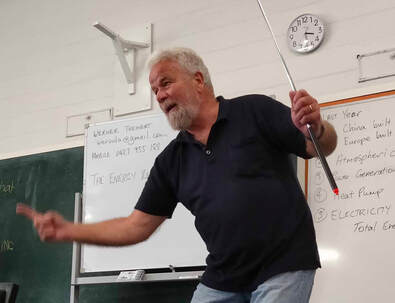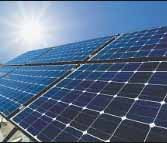 Werner Theinert spreads the word
Werner Theinert spreads the word WERNER Theinert is explaining the Coefficient of Performance of heat pumps to us. It’s like the miracle of the loaves and the fishes. You put in one unit of energy and get back two to three units of cooling or heating.
Werner has written on the blackboard: THE ENERGY REVOLUTION IS HERE! He loves this stuff. He's so excited he strides the width of the room with his pointer. I’m reminded of those old Energizer ads, which is apt since we are here at Bass Coast Adult Learning (BCAL) to learn about renewable energy as part of BCAL’s Sustainability Series.
| Interestingly, three of the five here today have connections to “the Valley”. Werner worked at the Yallourn Power Station in various roles for decades, interspersed by 15 years in the Middle East where he was in charge of power generation for an aluminium smelter. Sharon grew up in the Valley. Olivia was teaching in Morwell the day the big fire started at Hazelwood in 2014, blanketing the town in acrid smoke. None of them is sentimental about the impending end of coal-fired power generation. We students are all at different stages of the New Energy journey. Sharon Wilcox is a former health policy consultant who’s actually studied and lectured in renewable energy. Of course she’s made the switch from gas to electric. She’s installed a Tesla wallboard. I’m too embarrassed to ask whether you put a wallboard in a car or a house. Perhaps next week. | There are still places left in the Renewable Energy course. Mondays, Oct 17-Dec 12, 1-4pm. Cost $90 or $80 concession. Phone 5672 3115 or [email protected]. |
I know the least but I’m interested in the ideas and the sudden pace of change. I’m in the middle of the switch. Ten years ago when I built my house, gas was the go. Now, inspired by our council’s climate action plan, I’ve made a start. Last month I replaced my gas hot water system with a very small electric tank. Next on the list is a split system and an electric cooktop.
Werner has solar panels and an electric vehicle (EV). To my surprise he’s still connected to the main grid. That’s because he’s been waiting and waiting for the technology – a “black box”, he calls it – to allow his Leaf EV to act as the back-up power for his house. The technology has been available in Europe and the US for ages but Australia is still thinking about it. “We’re always trialling in this country,” he grumbles.
I struggle to get my mind around the difference between 40 kilowatts and 40 kilowatts an hour. Sometimes I nearly grasp it but then it recedes. How do volts relate to watts? Doesn’t matter. I’ll know by the end of the course.
We watch a video of Saul Griffiths, a laid back renewable energy guru, who explains why Australia is perfectly placed to lead the world. It’s not just our abundant sun but our enthusiastic adoption of solar panels – the highest rate in the world. You know, the PV panels that governments and power companies have been telling us are actually a bloody nuisance and disrupting the efficient working of the market.
Not according to Griffiths, who says we just need to think about how to use them more efficiently. He talks about the sweet spot of battery storage – not the home and not the central power station but the substation that connects to a neighbourhood or small suburb.
The most important thing any of us can do to reduce emissions is to go all-electric. House, car, the lot. The beauty of it is that it will also save us money. It’s win-win-win. You don’t have to go out and buy everything right now, but plan ahead so that when your gas hot water system gives up the ghost you replace it with an energy-efficient electric hot water system, ideally with a heat pump. Factor in the EV some time in the future.
While we watch the video, Werner jumps up periodically to write on the board apparently random thoughts: “Petrol 12c/km ... EV 1c/km. Power generation without water. Atmospheric rivers. Hydrogen wars.” He writes: Last year China built 20GWs of offshore wind. Europe built 30GW.”
I ask “Is that a lot or a little?”
A lot, he says. Enough to power the entre eastern seaboard of Australia. Australia is just starting on its offshore wind generation journey with exploration of possible sites around Gippsland.
So how much renewable energy does Australia need? 25GW if we’re replacing the current load – but if the entire economy, including transport and industry, switches to electricity – as it must – we need three times that. So 75 GW.
By the time we walk out at the end of three hours we’ve caught Werner's buzz. Feels like a revolution is coming, and we’re a humble part of it.
Disclaimer: If I’ve got my facts and figures wrong, don’t blame Werner.

